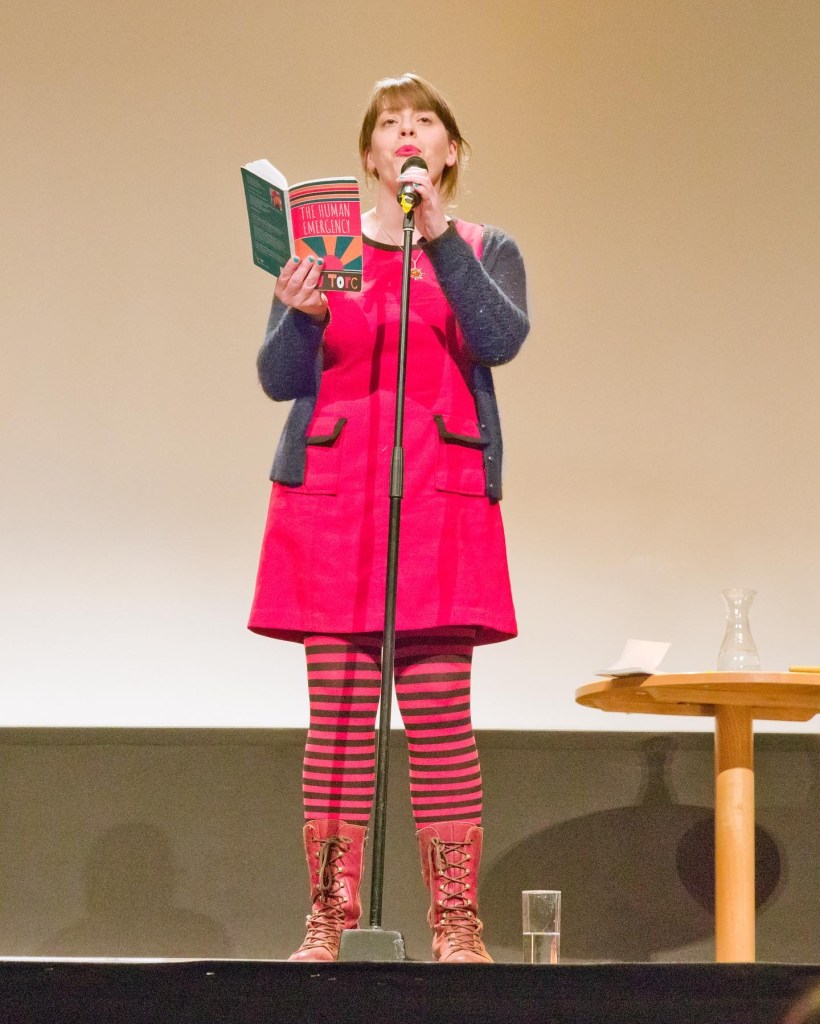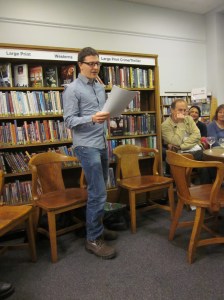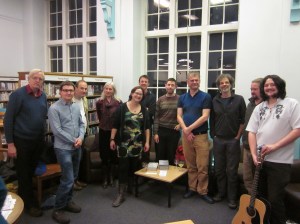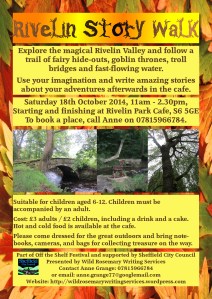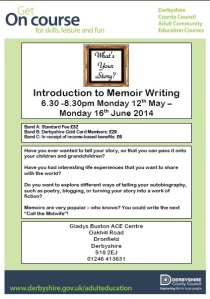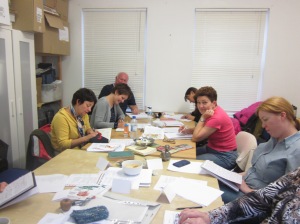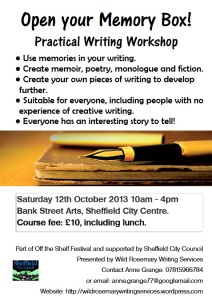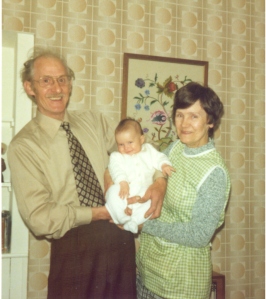-
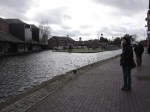
-
Coventry Canal Basin
-
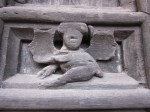
-
Sinister winged figure carved in the door of Holy Trinity church, Coventry
-
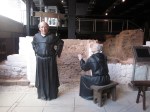
-
Monks in the undercroft of Coventry Priory
-

-
Old stonework near the old Priory
I spent last weekend in Coventry, catching up with friends and exploring the city.
But the reason I was there in the first place was to attend a workshop for writers, organised by the National Association of Writers in Education (NAWE). I joined NAWE as soon as I became a freelance writer, and I enjoy reading the association’s magazine, which inspires me to try new things in my workshops and teaching. This was the first time I had actually met other writers doing the same sort of thing I’m doing, and I was a little nervous, but definitely excited!
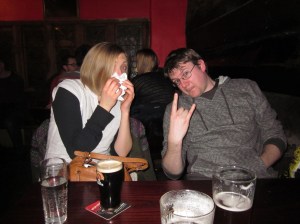
Rockin’ in Whitefriars
I’d spent the Friday evening in the Whitefriars Olde Ale House, in the centre of Coventry, drinking real ale with my friends Fraser and Louise, who I first met eight years ago at Wychwood festival, the first time I volunteered at a festival alone. I wasn’t alone for very long! On Friday night, we caught up with each other in the pub, which is a half-timbered fourteenth century building, with wonky floors, low beams and an open fireplace, which we huddled near. It’s actually been a pub for about fourteen years, but obviously the building goes back much further. It’s a rare survival of such an old building in Coventry. The city is now famous for the Blitz, on the night of 14th November 1940 (tying in with my last post!), when thousands of incendiary bombs rained down on the medieval city centre. The cathedral was destroyed, but became a memorial of international reconciliation and peace, with the beautiful modern cathedral, which was finished in 1962, by its side. Back to the Whitefriars, one of Fraser’s favourite pubs! It’s also a rock pub, so our real ale heaven was accompanied by the Mission, the Cure, Hawkwind and Motorhead. If I could design my ideal pub….
Fraser’s parents were very kindly putting Louise and I up for the weekend and we walked home in the rain, chatting and trying not to get blown away!
The day of the “Working as a Writer in Community Settings” workshop started sunny and deceptively spring-like, but I should have known not to wear a short black dress that flared out, creating a Marilyn Monroe – type effect whenever the wind blew! I walked into the centre of Coventry. Fraser pointed me in the right direction and challenged me to find anything interesting on the long, straight road into town. Everything looked good in the bright sunlight, so I challenged myself to write a poem in my head as I was walking along. I can remember:
The van of a heating engineer called Warmington.
People queuing up to wash their dirty cars.
A broken advertising hoarding.
Fairy tale tangles of briars and bramble.
A train flashing past.
A section of fence painted like an England flag.
A large dog barking in a back garden.
I was soon in the city centre, and found the university building, the George Elliot building with ease. The university is in the city centre, and the mixture of modern and medieval buildings contrasted against the joyfully blue sky. The name of the building reminded me that I have never managed to get through the whole of Elliot’s novel ‘Middlemarch’. I cheated last year, and listened to it on CD. More exciting nineteenth century novels are available! George Elliot (her real name was Mary Anne Evans, but she wrote under a male name in order to be taken seriously) lived in Coventry for much of her early life. When it comes to nineteenth century literature, I’m more of a Thomas Hardy and Bronte sisters fan. Much more drama and passion!
Anyway, the NAWE conference was well signposted, and tutors from the creative writing degree at Coventry University were waiting on the ground floor to escort me, and another participant, to the room where the workshop would take place. I felt very warmly welcomed. I was fairly early, and as the other participants arrived, I realised that people had travelled from far and wide, including Scotland, to attend the workshop. As we introduced each other, it dawned on me that these are my colleagues. That the path I’ve chosen, as a freelance editor, writer and tutor, is actually a career, and not just some weird thing I’ve made up! Other poets, novelists, essayists and journalists are making their living teaching creative writing, being writers in residence and using their writing skills to help other people to tell their stories and make their voices heard. It was so exciting, that I was probably a bit too chatty – but I felt that I was in my element!
I was really keen to meet workshop leader River Wolton again. A former Derbyshire Poet Laureate, she lives in Grindleford in the Peak District and has worked with many communities in Sheffield. She remembered meeting me before, in my old job in the diverse area of Burngreave in Sheffield, when I helped her to design a poetry booklet! River talked us through two really inspiring community projects she’s been involved with: “Allowed Out“, a project discovering stories of LGBT activism and the history of the gay community in Sheffield; and a project with refugees and asylum seekers who have finally found a safe home in Sheffield, and who are now writing about their experiences and the precious things in their life. We discussed setting up our own projects, our excitement about the possibilities of working in the community and our worries and concerns. Led by River Wolton and Anne Caldwell from NAWE, we discussed the practicalities and inspiration for running projects in different community settings. The diverse case studies included older people in a library, primary school children, asylum seekers and refugee communities. The definition of community settings is wide-ranging, and could even include an internet-based community of people with a shared interest. Writing projects can be multi-media, including visual art and music.
We went for lunch in the nearby Herbert Gallery (where my friend Fraser works!) and I enjoyed talking to the other participants, finding out about Here Comes Everyone Magazine, the brainchild of Adam Steiner, a poet attending the course. The magazine is a social enterprise, open to everyone to contribute. Why don’t you have a go yourself?
After lunch, we worked in pairs to set short and long-term goals for ourselves! I realised that I need to commit more time to my own writing. I’m working towards the end of the first draft of my second novel, and I need to keep going, and set myself targets. I love balancing a hectic workload of editing and teaching, but I mustn’t devalue my own writing! My first novel Outside Inside is available on the Amazon Kindle – one of the things I must do is to bring out a paperback issue – there, I said it, and I must do it. It’s so easy to put things off!
Our confidence boosted, we discussed funding options with Anne Caldwell and Jonathan Davidson from Writing West Midlands, and I was excited to find out that the creative writing project I’m working on with patients at Newholme Hospital in Bakewell could be eligible for Arts Council funding. The next step is to put a proposal together and put a bid in. Exciting times! I just need to put the work in now.
The NAWE workshop left me buzzing, and with lots of new ideas and a new group of like-minded contacts. All that remains is for me to get on with it and do the work. That’s the only way anything gets done. It’s no good just dreaming. You’ve got to take action too! Well, it’s worked so far….
After the workshop, I drafted a new section of my novel in Coventry’s other great institution, Browns, a pub/cafe, a modern building with lots of wooden furniture and a distinctive curved roof. Then Fraser and Louise rejoined me after an exciting trip to Birmingham and Wolverhampton, where they had bought me some charity shop birthday presents. We met more friends, some of them from the world of festival stewarding, and so many Coventry friends of Fraser’s, it felt like I was in the middle of a social whirl. It was lovely to talk to so many people, and I had a lovely vegan moussaka for only £6, as well as a few pints of Thatcher’s Gold cider. Finally, we were spilled out into another windy, rainy night.
Sunday was mostly bright again, but freezing, and we explored Coventry City Centre before I headed back to Sheffield, refreshed and determined to put my creative plans into action.

